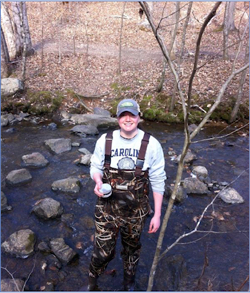Recent News
Grant Rudnick named Breece Award recipient
December 2, 2025
UNM wins demo award at International Workshop in Structural Health Monitoring
December 2, 2025
Ferenchak named chair of Transportation Research Board Pedestrian Committee
October 31, 2025
Ferenchak named APBP 2025 Research Professional of the Year
October 1, 2025
News Archives
PhD Candidate Kaylyn Gootman (University of North Carolina) Will Visit Lab of Dr. Gonzalez-Pinzon in Late Spring
March 10, 2016
This spring, from May 8th through June 11th, with support from the 2015 CUASHI Pathfinder Graduate Student Fellowship Program, Kaylyn will work on answering some of her dissertation research questions in the Jemez River basin of New Mexico. This area experiences sustained upland erosion that is already recognized as a potential source of streambed clogging. A research visit to Dr. Gonzalez-Pinzon’s lab will provide Kaylyn with the opportunity to not only study hyporheic flow in a region with a high natural abundance of sediment transport, but she will also learn how to use the 'smart' tracer resazurin as a technique to quantify how changes in streambed structure impact ecological function. Kaylyn's research projects seek to understand how reach size and storm events impact hyporheic zone clogging and aerobic respiration in an area that experiences sustained fine particle erosion. She will study the effects of stream order on hyporheic zone clogging and aerobic respiration in the Jemez River, a tributary to the Rio Grande. Additionally, Kaylyn will look at the impacts of storm events on temporary hyporheic zone clogging remediation by examining aerobic respiration before and after rainstorms. Understanding how varying river size and storms impact hyporheic zone structure and function are necessary to answer her broader dissertation research questions.
Kaylyn's research will be coupled with Dr. Gonzalez-Pinzon’s ongoing research on quantifying (via actual field measurements) biogeochemical processes along river continuums.
About Kaylyn:
During her undergraduate studies, Kaylyn took her interests in the movement of water further and started to study connectivity between moving water and the landscape. After graduation, her first research projects involved studying North Carolina tidal freshwater rivers and how their functions contribute to ecosystem services across sub-basin scales. After working a few years with the U.S. EPA, Kaylyn was ready to start graduate school and spend time studying rivers at the watershed scale. When she started at the University of North Carolina, she knew her advisor, Dr. Jaye Cable, would be the perfect person to help her develop her research questions, as she could advise her on how to incorporate groundwater into study designs. However, she quickly learned that her interests in watersheds would need to be 'scaled down' to a level that would be manageable over the course of a Ph.D. Luckily, after many literature searches and discussions with Dr. Cable, Kaylyn was able to narrow her focus from watersheds to streambeds. While she still appreciates riverine processes at the watershed-scale, she recognizes that having an understanding of smaller scale processes provides the foundation for our riverine knowledge across all scales. As a Ph.D. candidate in the Curriculum in Environment and Ecology at the University of North Carolina, Kaylyn focuses her studies on interactions between surface water and groundwater within streambed environments. Her research is about how changes in streambed structure impact ecological function. More specifically, she is interested in how these exchanges occur in the active region of the streambed, or hyporheic zone, and what happens functionally when streambed fine particle clogging interrupts this process.

"I look forward to my time in New Mexico and at the University of New Mexico and hope to apply what I learn to my study of streambed structure and function in North Carolina".
Kaylyn Gootman.
